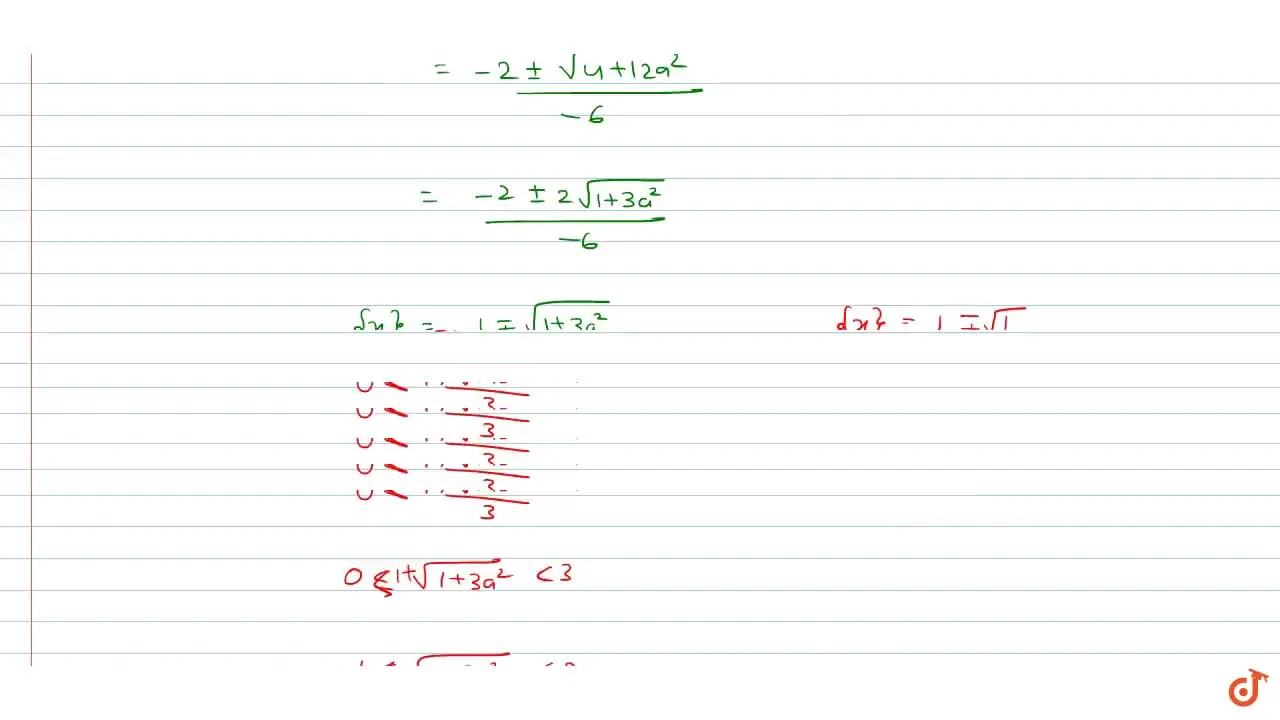If a∈R and the equation −3(x−[x])2+2(x−[x])+a2=0 (where [x] denotes the greatest integer ≤x) has no integral solution, then all possible values of a lie in the interval: (1) (-2,-1) (2) (∞,−2)∪(2,∞) (3) (−1,0)∪(0,1) (4) (1,2)
(−2,−1)
(−∞,−2)∪(2,∞)
(−1,0)∪(0,1)
(1, 2)
The correct Answer is:C
Let {x} = x - [x] be the fractional part of x. Then, 0≤{x}<1and{x}=0 when x is an integer.
If the equation −3(x−[x])2+2(x−[x])+a2=0 has no integral solution, then roots of the equation −3{x}2+2{x}+a2=0 lie in the interval (0, 1). This is possible if
(i) 4+12a2≥0 [Discriminant≥0]
(ii) −2−6>0 [∵−b2a>0]
(iii) −3+2∣a2<0 [∵f(0)<0,f(1)<0]
These three suggest that a∈(−1,1). But, a = 0 gives {x} = 0 i.e. x is an integer. So, a ≠ 0. Hence, a ≠(−1,0)∪(0,1).
Related Playlists
- BOOK - OBJECTIVE RD SHARMACHAPTER - QUADRATIC EXPRESSIONS AND EQUATIONS EXERCISE - Section II - Assertion Reason Type22videos
QUADRATIC EXPRESSIONS AND EQUATIONS
- BOOK - OBJECTIVE RD SHARMACHAPTER - QUADRATIC EXPRESSIONS AND EQUATIONS EXERCISE - Exercise138videos
QUADRATIC EXPRESSIONS AND EQUATIONS
- BOOK - OBJECTIVE RD SHARMACHAPTER - QUADRATIC EXPRESSIONS AND EQUATIONS EXERCISE - Chapter Test50videos
QUADRATIC EXPRESSIONS AND EQUATIONS
- BOOK - OBJECTIVE RD SHARMACHAPTER - PROBABILITY EXERCISE - Chapter Test45videos
PROBABILITY
- BOOK - OBJECTIVE RD SHARMACHAPTER - SEQUENCES AND SERIESEXERCISE - Chapter Test60videos
SEQUENCES AND SERIES
Similar Questions
If a∈R and the equation −3(x−[x])2+2(x−[x])+a2=0 (where [x] denotes the greatest integer x) has no integral solution, then all possible values of a lie in the interval (1) (−1,0)∪(0,1) (2) (1, 2) (3) (−2,−1) (4) (−∞,−2)∪(2,∞)
View SolutionIf a∈R and the equation −3(x−[x])2+2(x−[x])+a2=0 (where [x] denotes the greatest integer x) has no integral solution, then all possible values of a lie in the interval (1) (−1,0)∪(0,1) (2) (1, 2) (3) (−2,−1) (4) (−∞,−2)∪(2,∞)
View SolutionIf a ∈ R and the equation (a−2)(x−[x])2+2(x−[x])+a2=0 (where [x] denotes the greatest integer function) has no integral solution and has exactly one solution in (2, 3), then a lies in the interval
View SolutionIf [x] denotes the greatest integer ≤x , then number of solutions of the equation x2−2−2[x]=0 is
View SolutionThe value of the integral, ∫31[x2−2x–2]dx , where [x] denotes the greatest integer less than or equal to x, is :
View SolutionIf f(x)={x[x],0≤x≤2and(x−1)[x],2≤x≤3 , where [x] denotes the greatest integer function, then
View SolutionEvaluate
∫∞0[3x2+1]dx
where [.] denotes the greatest integer function.View SolutionFind the values of x graphically satisfying [x]−1+x2≤0 where [.] denotes the greatest integer function.
View SolutionIf [x] denotes the greatest integer less than or equal to x, then evaluate (lim)n→∞1n3{[12x]+[22x]+[32x]+}[n2x]}
View SolutionThe domain of f(x)=log12log4log3[x−λ]2 (where [ ] denotes the greatest integer function) is (−∞,2]∪[6,∞) then the value of λ is
View Solution


